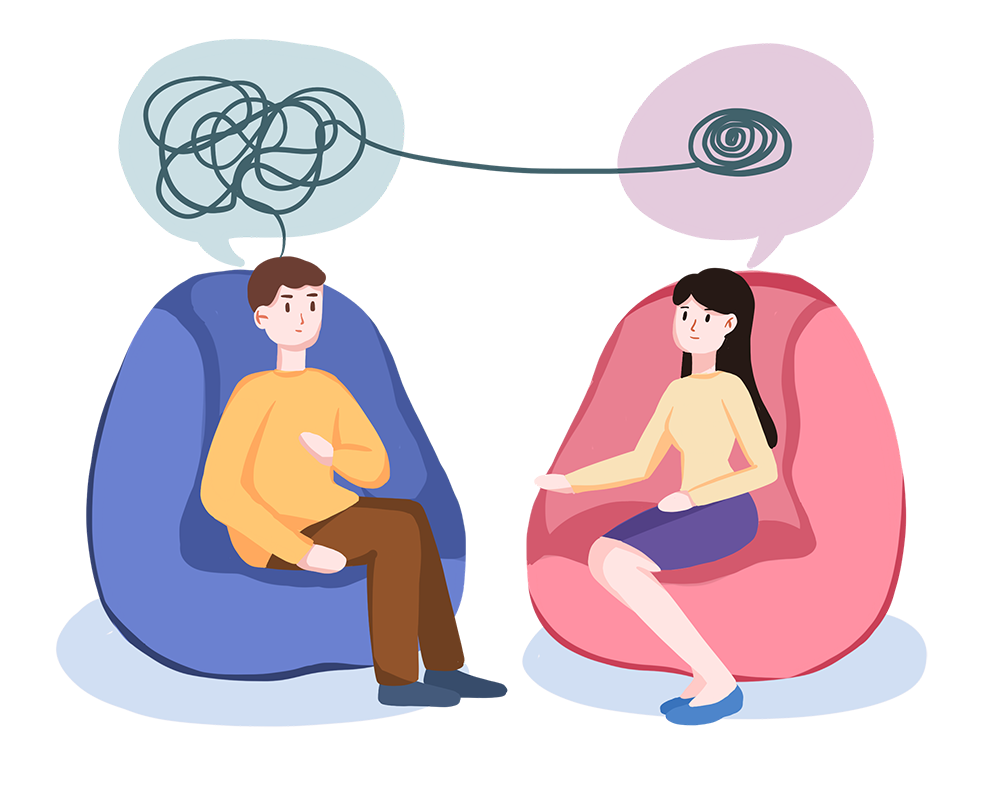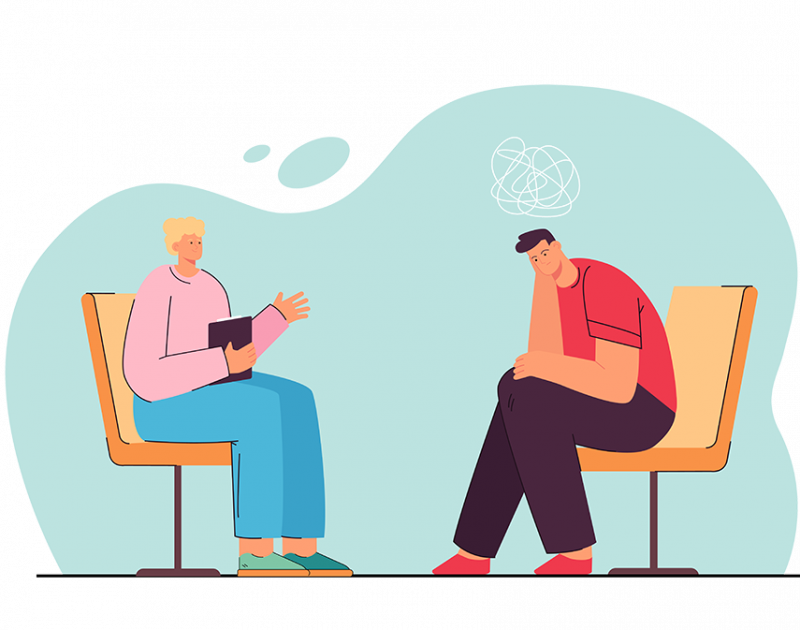TMS Therapy
In Atlanta
We offer a wide range of options to treat mental health conditions, including TMS (transcranial magnetic stimulation) therapy in Atlanta. TMS is a drug-free form of treatment that is non-invasive, safe, and approved by the FDA. As a result, it can be highly effective in treating a variety of mental health conditions.
Medically Reviewed: Dr. Zohaib Haque
Author: Atlanta Integrative Psychiatry Team
Last Updated: May 8, 2024

What Is TMS Therapy?
TMS, or Transcranial Magnetic Stimulation, is a type of non-invasive and non-sedative treatment for depression and other mental health disorders. It involves using a magnetic field generator, or ‘coil’, to deliver targeted pulses to the brain, specifically to areas thought to be involved in mood regulation. The goal is to stimulate these brain cells, encouraging them to function more effectively.
TMS therapy is often considered when traditional treatments, like medication or psychotherapy, are not effective or cannot be used due to side effects. It is also sometimes used in combination with these treatments to increase their effectiveness.
How Does TMS Therapy in Atlanta Work?
Our TMS therapy in Atlanta follows a protocol similar to most other forms of TMS therapy. During treatment, an electromagnet is placed on the scalp, and a series of magnetic pulses are sent to the targeted areas of the brain.
These pulses stimulate the nerve cells, which can help improve the symptoms of the disorder being treated.
Depending on the condition and the patient’s individual needs, treatment sessions typically last 30-45 minutes and are repeated up to five times per week for up to six weeks. After a course of treatment, many patients experience a significant improvement in their symptoms.
What Conditions Does TMS Treat?
TMS therapy is FDA-approved to treat depression in patients who have not responded to other treatments, such as medication and psychotherapy. In addition, TMS is also being used to treat a variety of other psychiatric disorders, including:
- Depression
- Obsessive-Compulsive Disorder (OCD)
- Bipolar
- Anxiety
- Demenita
- Parkinson's Disease
- Dementia
- Memory Loss
- Personality Disorder
- Migrains
- Smoking Cessation

- What Are the Side Effects of TMS Therapy?
- Is TMS Therapy Safe?
- What to Expect During a TMS Therapy Session in Atlanta
- Benefits of TMS Therapy
The most common side effects of TMS therapy are mild and temporary. These include scalp discomfort or irritation, lightheadedness, and headaches. Normally, within the first week of TMS therapy, patients report that these side effects have subsided.
When starting TMS, if you experience these side effects, they can be treated using a non-prescription pain reliever. It is essential to inform your therapist if you are experiencing any side effects.
In addition, in rare cases – less than 1 percent – some patients have reported seizures. However, they are usually mild and do not require medical attention. Nevertheless, before starting TMS therapy, you need to inform your therapist if you have had seizures or are at risk for seizures.
The U.S. Food and Drug Administration (FDA) cleared it for the treatment of depression in 2008, and it has since been approved for other conditions like obsessive-compulsive disorder.
There are also certain conditions where TMS may not be recommended, such as if you have metal implants in or near the head (excluding dental fillings), if you are pregnant, or if you have a history of seizures or brain damage.
TMS should not be considered a first-line treatment, but rather a treatment option for patients who have not responded to initial antidepressant medication.
During a TMS therapy session, you will be seated in a comfortable chair and fitted with a specialized helmet that contains the magnetic coil. The magnetic pulses will then be sent to the targeted areas of the brain.
Patients can relax and read a book, watch videos on their phones, or listen to music since they are awake during the treatment session. After getting accustomed to TMS therapy, some patients find sessions relaxing and will take a short nap during treatment.
This process is typically painless, though some patients may experience a slight tapping sensation on the scalp. Treatment sessions typically last 30-45 minutes, although this may vary depending on the condition being treated. After a course of treatment, many patients experience a significant improvement in their symptoms.
Some of the benefits patients gain with TMS therapy in Atlanta include the following:
- TMS can start working immediately, unlike medications. Medication for treating mental health disorders can take weeks before its effects are realized. In addition, not all patients will notice any improvement with drug therapy.
- TMS requires no sedation. One primary benefit of TMS is that you can drive yourself to and from your appointments. So, you never have to rely on friends or family to drive you home after treatments.
- TMS has very few side effects, unlike medications. People respond differently when taking medications for mental health disorders. As such, they can experience nausea, vomiting, upset stomach, diarrhea, insomnia, dizziness, headaches, reduced sex drive, changes in appetite, and dry mouth.
- TMS can be effective when other treatments are not working. When your mental health disorder is treatment-resistant to other forms of therapy, TMS often still works because it stimulates the different areas of the brain associated with your condition.
- You may be able to discontinue your medication with TMS Therapy. Some patients find they no longer need to continue relying on prescription medications to treat their mental health disorders because of the improvements they notice with TMS.
How Much Does TMS Therapy Cost?
The cost of Transcranial Magnetic Stimulation (TMS) can vary widely depending on factors like geographical location, whether you have health insurance, and whether your insurance plan covers TMS therapy.
However, it’s important to note that many insurance companies do cover TMS therapy for the treatment of depression, especially when other treatment options have not been effective. This coverage can significantly reduce the out-of-pocket cost for patients.
If you’re considering TMS therapy, schedule an appointment with us today. We’ll run a verification of benefits to ensure that your insurance covers TMS Therapy.
IS TMS Therapy Right for Me?
Determining if Transcranial Magnetic Stimulation (TMS) therapy is right for you is a decision that should be made in consultation with a qualified healthcare provider or mental health specialist. That being said, there are some general factors that could suggest TMS might be an appropriate treatment option for you:
- Treatment-Resistant Depression or other mental health disorders: TMS is often considered for individuals who have not seen improvement after trying other treatments, such as antidepressant medications or psychotherapy.
- Difficulty Tolerating Medication Side Effects: Some people find the side effects of psychiatric medications to be intolerable. If you're unable to take standard treatments for depression or other mental health disorders due to side effects, TMS might be a suitable alternative.
- Preference for Non-invasive Treatment: TMS is a non-invasive procedure that does not require sedation or anesthesia, and it does not have the systemic side effects that can occur with medications.
- General Health Status: TMS is generally safe, but it's not recommended for everyone. Certain conditions, such as having metal implants in or near the head (excluding dental fillings), pregnancy, or history of seizures or brain damage, may preclude you from being approved for TMS.
Find TMS Therapy in Atlanta Today!
Sources:
Gold, MD, M. (2022). What Is TMS and Can It Help Treat Withdrawal, Addiction, and Depression?
Ramanujam, MD, A. (2021). Examining the Benefits of TMS.
Find Mental Health Treatment in Atlanta Today
Atlanta Integrative Psychiatry is an Industry leader in mental health treatment . Our team of top medical experts specialize in dual diagnosis treat and are committed to ensuring that each patient is treated as an individual.
Call us today, we're avialable 24/7.




